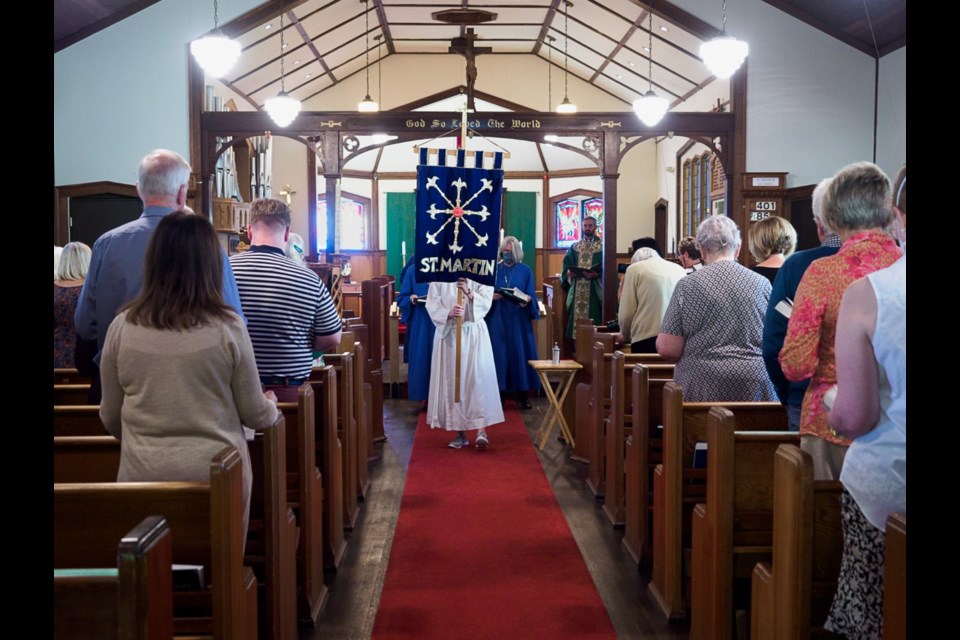To an outsider looking in, the occasion at St Martin’s Anglican Church on Sunday (Sept. 25) afternoon would have seemed like a celebratory affair.
Food was plentiful, the result of a hearty potluck effort, and the crowd was in its dozens. Upon closer inspection, however, the watcher would have noticed how some smiles were tinged with sorrow, and embraces were more farewell than festive. It hadn’t been a wedding, or a baptism, as one might have presumed. Rather, it had been the church’s final ever service of worship. After 122 years of unrelenting service, St Martin’s Anglican Church was closing its doors.
Pastor Mark Munn had been taken aback by the poignancy awakened in him that afternoon. He had only worked with the Upper Lonsdale church since January, and had known since the beginning of its impending end.
“I wasn’t expecting it to be emotional for me, but I was really quite sad,” he reflects in a phone call the following day.
“I’ve spent nine months now with these people, being with them weekly. I saw just how hurt they were, but also how proud they were. It was quite the day for everybody, including me.”
While news of its closure had been saddening, it hadn’t come as much of a surprise to its long-standing community. Across the country churches are closing at a rapid rate, and not just Anglican churches, but those across all denominations.
Munn quotes Putnam’s Bowling Alone when discussing the reasons for why he thinks that is, attributing much of it to the general decline of community engagement, and the rise in home entertainment and individual pursuits.
“Communal activity has dropped in the last 30 or 40 or so years, including political parties and sporting events like bowling leagues – and churches are no exception,” he says.
“There was a time when those things filled social needs, the community’s social needs. The way we now have those needs met has changed dramatically.”
As the community’s needs have changed so too have its desires, with loyalty wavering not just in terms of religion, but to towns, cities or even countries, too.
“We have parishioners here that started going to St. Martin's 60 years ago,” says Munn.
“We have people in their 70s who were baptized here, and have been coming here every Sunday since. That would be a very atypical thing now, to stay in the same neighbourhood that long.”
Throw COVID-19 into the mix and it’s no surprise that St. Martin’s found itself on the path to becoming a folded establishment. Now those steadfast few who have been with the church for six or seven decades are faced with a question: Do they abandon ship in search of another place of worship, thus having to re-enter a new community and establish new relationships later in life, or will they follow St. Martin’s when it merges with St. John the Evangelist, a church a few blocks away, on Oct. 2?
Munn expects about a third to stay and a third to leave. As for the rest, he says, “they will probably spend some time figuring out what the next step of their spiritual life looks like.” That might not be Anglicanism, he adds, it may not even involve the church at all.
The future plans of the parishioners may differ, but when it comes to how each regards St Martin’s itself, their feelings are unanimous.
Howard and Cathy Dallimore joined the church when they moved to North Vancouver from Wales in 1975. Warmly welcomed by the community and with services just like the ones they had grown up with in Cardiff, the two became settled and the church, says Cathy, went on to play an essential part in their lives “spiritually, socially and emotionally” for the next 47 years.
“For several years we were aware that the closing of St. Martin’s was probably inevitable, but the reality is just beginning to sink in and, even though the church is merging with St. John’s, we are experiencing a profound sense of loss.”
The Dallimores aren’t alone. Kathie Boyd also joined in 1975 and says that it’s “hard to put the feelings into words” on such a large part of her life coming to a close. “I’ll always remember our services here, and will miss them greatly,” she adds.
Yet in the midst of the sadness felt among the crowd on Sunday there had also been a glimmer of hope, with parishioners and staff choosing to look to the future rather than dwell on the past.
“Yes, the closing of St. Martin’s is sad; a community has been lost, but out of that loss comes new life and opportunities to seek something new and forge new relationships,” points out former parish administrator Sarah Sykes, who had been with the church for eight years.
As for the building itself, Munn assures that the diocese intends to keep it as a site of Christian worship. What that will be is still to be decided upon – there are talks of it being rented by an Orthodox community, but no concrete plans as of yet. One thing is for certain: with no plans to sell or redevelop any time soon, past followers, staff and locals alike can rest easy knowing the brick and mortar building will stay – a consistent visual reminder of Sundays gone by.
Mina Kerr-Lazenby is the North Shore News' Indigenous and civic affairs reporter. This reporting beat is made possible by the Local Journalism Initiative.



